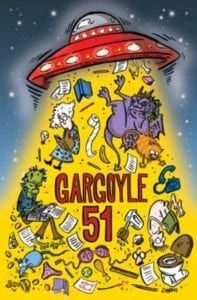Richard Peabody Talks Gargoyle Magazine
Buzz McClain of Northern Virginia Magazine sat down with Richard and others close to him in order to ask a very important question: What’s next for Richard Peabody?
Founder of the DC-ubiquitous annual magazine, Gargoyle, esteemed editor and writer in his own regard, Richard has recently put out through Alan Squire Publishing a compendium of his work, The Richard Peabody Reader…so, what’s next?
Read the full article here
 A Long Excerpt:
A Long Excerpt:
“For a while Gargoyle was pretty regular, but I’d say for the last 20 issues it’s always been ‘Well, this could be the last one,’” says Michael Dirda.
Dirda, who won a Pulitzer Prize in 1993 for literary criticism (so he should know!), continues to do a weekly books column in The Washington Post. He’s known Peabody since the beginning, not because Peabody sought him out and curried favor but because Peabody was omnipresent in the regional literary scene. Plus, they worked at the same bookshop, the venerated Quill & Brush in Bethesda. (Peabody was the shop’s third employee.)
 “He was part of the [literary] circle around this bookstore,” says Dirda, who contributed an expansive introduction to The Richard Peabody Reader. “He was incredibly good-looking, charismatic, like a boyish Warren Beatty in his heyday. He had so much energy for books and poetry; people found him incredibly attractive in multiple ways, and [he] was a real live wire. And I would run into him from that time on anytime I would go to literary events. Rick was everywhere. He was really active in the literary scene.”
“He was part of the [literary] circle around this bookstore,” says Dirda, who contributed an expansive introduction to The Richard Peabody Reader. “He was incredibly good-looking, charismatic, like a boyish Warren Beatty in his heyday. He had so much energy for books and poetry; people found him incredibly attractive in multiple ways, and [he] was a real live wire. And I would run into him from that time on anytime I would go to literary events. Rick was everywhere. He was really active in the literary scene.”
Peabody served a greater, or at least equal, purpose than publisher and editor. He was an indefatigable networking connector, putting people together who probably needed to know each other.
“He is kind of a literary activist,” says Dirda. “He really believes in the power and value of books and poetry, and he wanted to promote the growth of it as much as he could. And in that sense he was selfless—he did the magazine for the benefit of the contributors. And he’s contributed a lot of time to helping younger writers as a teacher. He’s become much beloved in the greater Washington literary community.
“I admire him a lot,” Dirda says. “He’s truly devoted his life to the cause of literature, particularly Washington-based literature. Very few other people have done that.”
other people have done that.”
Not to be overlooked are Peabody’s own writings, which Dirda almost did.
“He’s not as nationally known as he should be,” says Dirda. “Until I wrote the introduction to the book I was unaware of how good a writer he is, and I think more people should be aware of him. In my view The Richard Peabody Reader should have lots of readers. Not only is he a good writer, he is very entertaining and funny. And very sexy, too.”
Dirda points out that Northern Virginia readers will recognize many of the locales in Peabody’s stories and poems. Arlington, Georgetown and suburban Maryland landmarks abound.
“You feel right at home when you turn the page,” says Dirda.
Chances are your idea of a literary magazine is something you encountered in college because many colleges feel obligated to publish the youthful-yet-impenetrable yearnings of budding bookish doyens or the more polished but unmarketable-for-many-reasons works of would-be giants-in-their-own-minds.
Gargoyle is not that.
Gargoyle is accessible and full of surprises, written by people who are probably your neighbors, not New York literati. The settings are familiar. The plots ring true. The dialogue is in your vernacular. It’s a fun read, and you feel enlightened, entertained or entranced at the end. Erudition is not required.
Not content with not making money on book-bound literary magazines, Peabody branched out, publishing with co-editor Ebersole compilations of writings about pop culture icons including Mondo Barbie: Essays on Exile and Memory; Mondo Elvis: A Collection of Stories and Poems About Elvis; Kiss the Sky: Fiction & Poetry Starring Jimi Hendrix; and Mondo James Dean.
Naturally, he was sued by Mattel, the Elvis Presley estate and the gonzo singer-songwriter Mojo Nixon, who took exception to his lyrics from “Elvis Is Everywhere” being used elsewhere. (Nixon settled for copies of the book and a couple of cases of beer.)